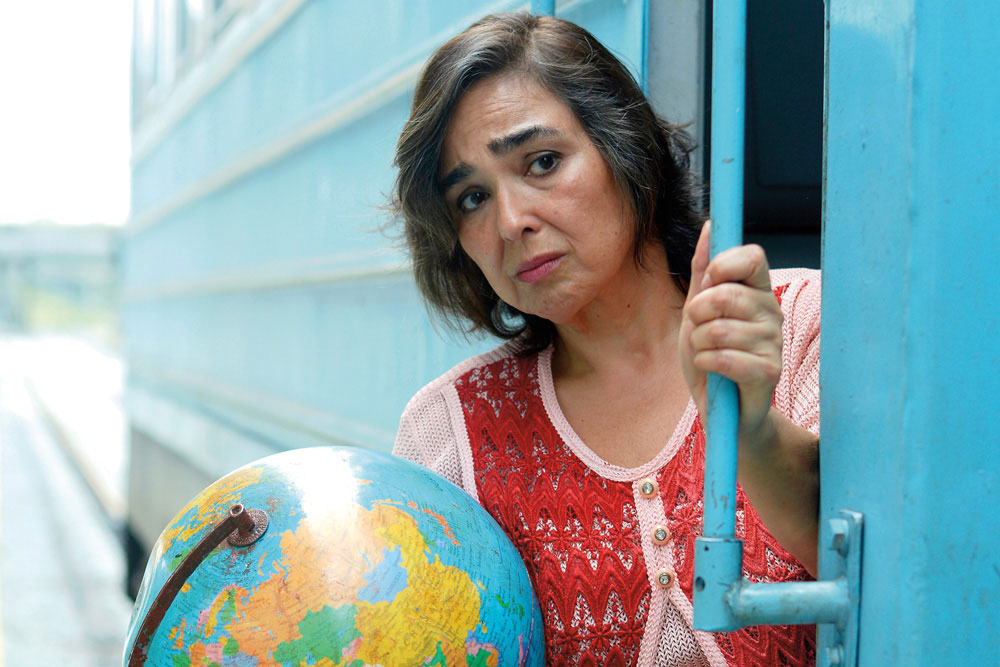“Everything about Cuba is so politicised that any story is read as an allegory”
Celeste García is a guide at Havana’s planetarium. Nearing old age, she retains a cynicism-free outlook, despite Cuba’s hardships and personal disappointments. One day the authorities announce that a race of aliens from the planet Gryok — who have been living incognito on the island — have extended an invitation to the Cuban people to come live with them. Good fortune bumps Celeste to the front of the departure queue, and she grabs this opportunity to start over in a galaxy far, far away with both hands.
The Extraordinary Journey of Celeste García is the debut feature by writer and director Arturo Infante, one of a new generation of independent Cuban filmmakers. It’s a charming seriocomedy, anchored by a performance by María Isabel Díaz as Celeste that movingly blends humour and melancholy. Jonathan Ali speaks with Arturo Infante about bringing his unique science-fiction vision to the big screen.
What inspired the film’s premise?
I really enjoy science fiction. In the 1980s, I saw a lot of American movies that were shown in theatres in Cuba. E.T., Cocoon, Gremlins — to name a few films — contributed to this love for the genre. On the other hand, whenever I write, I feel more empathy with female characters. I suppose that Celeste is a natural mixture of these two things.
The film has that science fiction premise, yet is grounded in contemporary Cuban reality.
I always knew the movie should focus on Celeste’s everyday life. And that everything about Gryok should remain in the background. Also, I did not have the resources for too many visual effects.
In any case, it’s the allegorical use of the speculative, not its spectacular component, that resonates.
Yes. There is a metaphor in this. For many years — although not so much now — Cuba was isolated from the rest of the world. Everything about foreign countries sounded distant, exotic, and surprising, as if you were talking of another world. Also, emigration had a much more definitive nature — people left Cuba for good, and they said goodbye to their families as if they were travelling to a distant galaxy and thus would never have the chance to meet them again.
The existence of Gryok and extraterrestrials is treated in an absurdly humorous, matter-of-fact way.
Many years of economic difficulties, I think, have made Cubans a little insensitive to astonishment, or the mystery of existence. People live close to reality, surviving day to day, losing the ability to dream. Of all the characters, only Celeste keeps intact her curiosity and capacity for wonder — the others see Gryok only as an opportunity to get some kind of practical advantage.
The satire is strongest when Celeste and the others are awaiting the arrival of the spaceship from Gryok. The transfer facility feels like Cuban society in miniature, with its excessive officialdom and rumours of corruption. How much does this reflect reality?
Everything about Cuba is so politicised that any story is read as an allegory. That is something you must assume and use in your favour. My fundamental goal was not to make a metaphor about Cuban society, but I was aware that it would inevitably be read like that. The head of the camp particularly embodies that type of petty authoritarian officer who enjoys her power and uses it despotically. Even though she proves to be not such a bad person at the end.
As a woman in late middle age, Celeste García is the kind of protagonist we seldom see in cinema. What made you choose her?
I feel more empathy towards that generation, the generation of my parents. It is a generation marked by disappointment and disenchantment. They gave the best years of their lives to the realisation of a social project that did not turn out as they dreamed. It was also a way to subvert gender conventions. Normally, the main character would be a young and beautiful girl, with all of life ahead of her. By choosing an older woman, I’m trying to make the audience feel a much stronger empathy. And I also wanted to talk about second chances in life. It’s never too late to start over, if you find the courage to do it.
The Extraordinary Journey of Celeste García
Director: Arturo Infante
Cuba
92 minutes


















